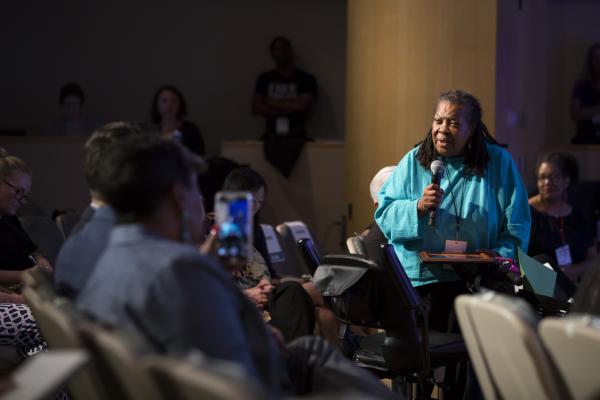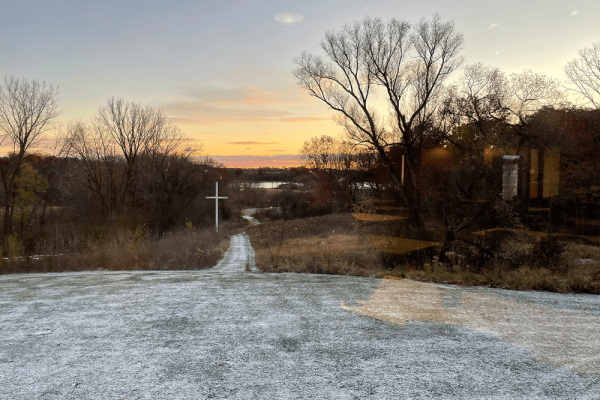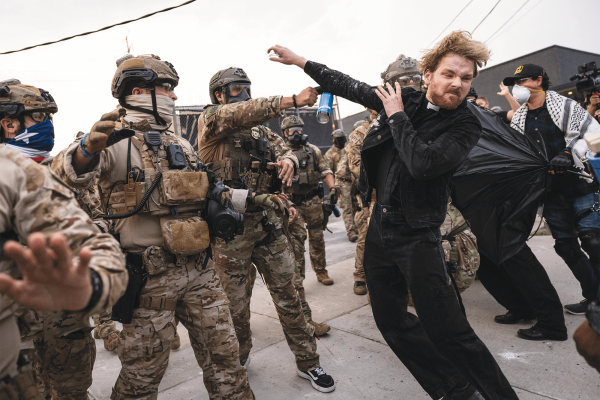This poem came into being after listening to the interview Krista Tippet had with Ruby Sales on her podcast On Being. This was not long after the events that took place in Charlottesville, Va.
It is from that unedited version of this episode called "Where Does It Hurt" that I gleaned many of the details mentioned in the poem.
I’d like to think that this poem — and even perhaps the form of this poem — is, in a way, another kind of monument, for all to see, a remembrance, lest we forget.
Listen
You listen to her tell the story — then listen to her tell it again.
You want to learn her story by heart so you never forget
what she told that interviewer about the time she was arrested
for protesting — when she was just seventeen.
How she had been scared
because she knew that county, Lowndes County, knew that city, Fort Deposit
Alabama, knew it was called a bloody city, because people died there.
But she had to go, had to care, had to join those twenty nine others to protest
in front of that whites only store.
Knew the police would come, and they did, but so did the mob of white men with guns and clubs and trash cans.
Which is why she was never so glad to be put in the back of that garbage truck
the police used to take them to the cramped city jail. A garbage truck.
And the jail stank, she said. And there was torture — yes America, she said
there was torture. What else do you call it when they throw you against the
wall of the cell, when they tell the women they are going to let the other prisoners
rape them? What else do you call it when they don’t feed you and hardly offer you
water, when if you get sick, like she did, they won’t call a doctor?
What do you call it, when after six days they tell you to get dressed, leave
and you’ve not been allowed to call anyone, ask them to be there to take you home
and you don’t know if the men with the guns and the clubs and the trash cans
will come again? But we had no choice, she said, so we got dressed, walked out the door
and stood outside. But since we were waiting, she said, and didn’t know how long
we would have to wait and because it was such a hot August night, and she was
so thirsty, she thought about getting a cold drink at the corner store
that was not for whites only.
And then she told the story everyone tells about her.
How she and Jonathan Daniels, that young white, Episcopal seminarian who had come from the north to protest too, who was arrested with her, and then slipped
notes to her in jail to keep her spirits up — how the two of them walked together to the store on the corner and how an unpaid, special deputy, a white man, was
barring the door, with a shotgun. How he leveled and pointed that shotgun at her. Would have killed her too, if Jonathan Daniels hadn’t pushed her to the ground,
then stepped in front of her, taking the full blast of Tom Coleman’s shotgun — dying.
How Tom Coleman leveled that shotgun again, and shot the white priest who had grabbed the hand of a frightened Black woman and tried to run. Shot him in the back. You listen again to her story, not wanting to believe any human would sift and sort and kill the other.
You listen to her story again, knowing it's not an old story.
Knowing you need to care. Knowing you can’t ever
let yourself forget.
You listen to her story again.
You need to hear
the steel in her voice.
— for Ruby Sales
End Notes:
Ruby Sales, participated in a protest and was arrested on Aug. 14, 1965 at the age of 17. She was a black college student and civil rights worker.
Jonathan Daniels, 26, a white seminarian and civil rights worker, accompanied Ruby to a corner store after she was released from jail. He was killed by Tom Coleman on Aug. 20, 1965. Coleman was aiming at Sales, but Daniels pushed her aside.
A white priest, Father Richard F. Morrisroe, grabbed the hand of another activist and ran, trying to escape. He was severely wounded, but did not die.
Coleman was accused of manslaughter and acquitted by an all-white jury. The result of the trial led to legal challenges and a reform of the jury selection procedures, which had long excluded black people.
Coleman continued working as an engineer for the state highway department. He died at the age of 86 on June 13, 1997, without having faced further prosecution.
Sales went on to become a college professor and continues to advocate for civil rights. She attended seminary and became an Episcopal priest. She also founded The SpiritHouse Project, a non-profit organization that uses the arts, research, education, action, and spirituality to bring diverse peoples together to work for racial, economic, and social justice, as well as for spiritual maturity.
Got something to say about what you're reading? We value your feedback!







